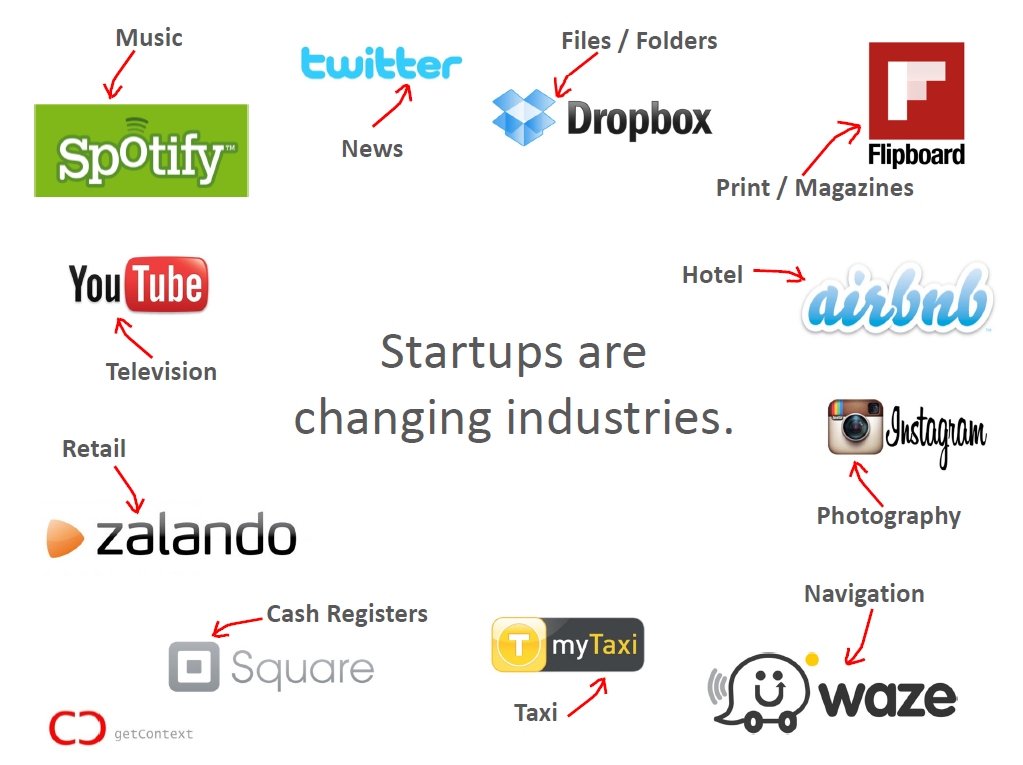What Corporates can learn from Startups
In case you haven’t noticed: times are changing. Technology – specifically the internet – is a central driver of this change. And technological change has accelerated in the last decades. Marc Andreesen referred to this a couple of years back as “Software is eating the world“. And if it hasn’t happened in your industry yet, be assured it will.
Smaller companies – often referred to as startups – have grasped the opportunity and have or currently are disrupting industries. Zalando for example has entered a fairly mature ecommerce market in 2009 and hit 1€ billion in revenue in 2012. It is now one of the leading ecommerce players in several countries. On the other hand some of the biggest companies in the (German) mail-order business had to close down in the last years. Kodak invented(!) the digital camera in 1975 and filed bankruptcy in 2012.
Here is what is fascinating:
- Big corporates have plenty of resources, a huge customer base, experts in market research etc. Why is it that they fail to innovate?
- Startups most of the time lack resources, a customer base, experts in market research etc. How do they come up with innovative, disruptive and eventually successful business models?
Luckily both questions have been answered. Clay Christensen has described the answer to the first question in his book The Innovator’s Dilemma. Go read it, it is really good.
Steve Blank and Eric Ries have built a framework called The Lean Startup to answer the second question. Whereas the Lean Startup lays the theoretical foundation, the The Lean Entrepreneur – which I recently reviewed – explains the more practical side on how to disrupt markets and build a successful business.
What does that mean for corporates though? Turning a blind eye and waiting to be disrupted is certainly not a very smart idea. And many corporates are not ignoring change. As there might be a big discrepancy in perception to how fast the change will happen – most have so far underestimated its velocity – corporates know in general that they have to act. Most just don’t know what to do.
The most obvious way to take part in disruptive innovation is by acquiring or investing in startups. This is something corporates have been doing since decades. However, profitable investments are hard even for experienced VCs. Turns out that acquisitions are as well for various reasons.
I have consulted several companies that are going through the innovators dilemma. Some of the companies that are aware of the dilemma are trying a third approach. They want to connect with the startup world to learn how to build (incubate) new business ideas and get into the “startup game”.
This has led to a flood of incubators. Most of which will not be profitable because of mediocre management, war for entrepreneurial talent and lack of knowledge on how to build startups. However, on a broader scale I think it is a positive development. Corporates can learn plenty from startups. Young people can “test” entrepreneurship as a career path in a safe environment. If this helps more people to think and act entrepreneurial and more corporates to integrate elements of the startup mindset and method, I am all for it.
I have put together a slide deck which explains the innovators dilemma, how startups build businesses and what corporates can learn from them. It merely scratches the surface but it is a start for now. Tell me what you think in the comments.
If you like this presentation you might also like my other presentations.
